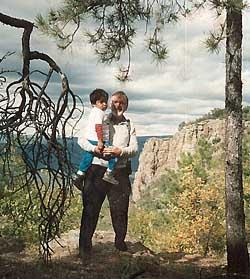Charles R. Kaut
Ph.D. University of Chicago 1955
1926 - 2021
Daily Progress: Obituary for Charles Kaut
I am retired from active participation in the daily doings of the department. I have been spending most of my time since 1993 living on the White Mountain Apache Reservation (Fort Apache) in central eastern Arizona. I am associated with the tribal adult education center there as a consultant and still maintain a living site with research and writing facilities on a quarter acre lot provided by tribe. When I am there I am available via E-mail on a daily basis.
I was directed to anthropology in 1947 by reading Ruth Benedict's PATTERNS OF CULTURE as an undergraduate. So, I belong to the G. I. Bill generation who came into anthropology after WWII. Most of us are now either emeritus or gone to stay with the culture icons of the 19th and middle 20th centuries somewhere or other. When I got my PhD in 1955 at Chicago the annual meeting of the American Anthropological Association could be held in about three discussion rooms. Sputnik(1957) and the push it gave to improve American education helped spur the inventory of professional anthropologists and undergraduate and graduate departments to impossible dimensions. Things have been different ever since. My career reflected those changes over almost five decades especially as I participated in the founding of this department starting in 1961 when there were five faculty members in a joint department of Anthropology and Sociology - and no PhD program until 1962 when a degree in "Social Anthropology" was approved.
At the University of Chicago I began research under W. Lloyd Warner on the funeral business on the South Side, spending a year working in a parlor as a night man. I wrote a master's paper on this and then began to study the Western Apache. In 1953 Fred Eggan provided me with a local grant of $850 to live out there in Arizona for most of the next two years. I did a basic ethnographic study of the community of Cibecue, but my dissertation was a reworking of Grenville Goodwin's masterful materials on the "clan system". My own materials deal mainly with the Apache belief system and ceremonial cycle as they were manifesting themselves in those long ago years. I am now part of the "tribal elders" in that most people my age and a bit younger are no longer with us. Apaches are interested in hearing about how things were in "the old days" which usually means before the late 1960s. I wish I had had a portable computer, tape recorder, and camcorder in those days! Note books, legal size pads, pencils, and a Brownie had to suffice(especially on $850).
While writing up my dissertation in 1955 I worked on the HRAF Handbook of the Philippines to stay alive and became interested in the Tagalog speaking people of Luzon and nearby islands. Since 1956 I have lived and worked in their area for several periods of two years and frequent(until recently) short visits. My interest has been the longitudinal observation of several rural communities with very distinctive basic agricultural patterns. This all has to do with a very old fashioned concern with the difference between social structure and social organization. I have studied these places to see if there are similar structural principles in all that produce different social organizational patterns in the life of people at particular points in time. I want to be able to look at these dynamic entities for both synchronic and diachronic similarities and differences.
I have been using my base in Arizona as a place to process not only "my" Apache materials but also the Tagalog. The most important part of the Apache data is a series of tapes and videos I made with Nelson Lupe, Sr., who was the first elected tribal chairman. I first met him in 1953 and we maintained a close relationship until his death in 1993. The tapes and videos represent his magnificent attempt to remember the details of his long life as part of a history of White Mountain Apache from an inside point of view. In the picture above, Teus is his grandson (age 2), who will be able to hear his grandfather tell him about the way things were- frequently in classic Apache.
